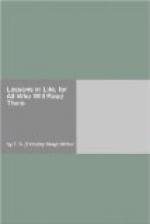So much “for the fun of it.”
FORGIVE AND FORGET.
Forgive and forget! Why the world would be lonely,
The garden a wilderness left to deform,
If the flowers but remembered the chilling winds only,
And the fields gave no verdure for fear of the storm! C. SWAIN.
“FORGIVE and forget, Herbert.”
“No, I will neither forgive nor forget. The thing was done wantonly. I never pass by a direct insult.”
“Admit that it was done wantonly; but this I doubt. He is an old friend, long tried and long esteemed. He could not have been himself; he must have been carried away by some wrong impulse, when he offended you.”
“He acted from something in him, of course.”
“We all do so. Nothing external can touch our volition, unless there be that within which corresponds to the impelling agent.”
“Very well. This conduct of Marston shows him to be internally unworthy of my regard; shows him to possess a trait of character that unfits him to be my friend. I have been mistaken in him. He now stands revealed in his true light, a mean-spirited fellow.”
“Don’t use such language towards Marston, my young friend.”
“He has no principle. He wished to render me ridiculous and do me harm. A man who could act as he did, cannot possess a spark of honourable feeling. Does a good fountain send forth bitter waters? Is not a tree known by its fruit? When a man seeks wantonly to insult and injure me, I discover that he wants principle, and wish to have no more to do with him.”
“Perhaps,” said the individual with whom Herbert Arnest was conversing, “it is your wounded self-love, more than your high regard for principle, that speaks so eloquently against Marston.”
“Mr. Welford!”
“Nay, my young friend, do not be offended with me. Your years, twice told, would not make mine. I have lived long enough to get a cool head and understand something of the springs of action that lie in the human heart. The best, at best, have little to be proud of, and much to lament over, in the matter of high and honourable impulses. It is a far easier thing to do wrong than right; far easier to be led away by our evil passions than to compel ourselves always to regard justice and judgment in our dealings with others. Test yourself by this rule. Would your feelings for Marston be the same if he had only acted toward another as he has acted toward you? Do not say ‘yes’ from a hasty impulse. Reflect coolly about it. If not, then it is not so much a regard to principle, as your regard to yourself, that causes you to be so bitterly offended.”
This plain language was not relished by the young man. It was touching the very thing in him that Marston had offended—his self-love. He replied, coldly—
“As for that, I am very well satisfied with my own reasons for being displeased with Marston; and am perfectly willing to be responsible for my own action in this case. I will change very much from my present feelings, if I ever have any thing more to do with him.”




